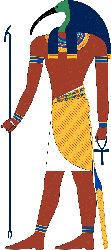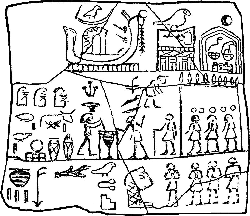WAS THOTH AN ATLANTEAN AND OTHER EGYPTIAN MATTERS

THOTH THE WESTERNER
In his syncretised guise of Hermes Trismegistus, the Egyptian god Thoth was credited with being the font of a wide variety of magical wisdom. It is, thus, little surprise that a number of writers on Atlantis have sought to make Thoth a survivor of Atlantis, who bore the collected wisdom of that sunken land eastward into Egypt.
Of course, there are major shortcomings to this theory, not least the internal evidence from the Atlantis dialogues, which explicitly present Atlantis as the enemy of Egypt. How such a Sethian actor could come to be regarded in certain spheres as the wellspring of Egyptian culture is surprising to say the least.
Nevertheless, there are Egyptian texts which credit Thoth with transporting various gods eastwards in the wake of a major catastrophe, usually presented as the aftermath of the primordial combat between Horus and Seth. To quote the independent researcher Alan Alford: -
With regards to R. Cedric Leonard's contention that Thoth was originally envisioned as a king of Egypt, this idea can be traced back to Ignatius Donnelly, who - in contrast to Leonard, who supposed that Thoth is identical with the predynastic Mekh/Imikhet who appears on the Palermo Stone as one of a number of rulers bearing the red crown of Lower Egypt - suggests that Thoth's pharaonic counterpart was Athothis, the supposed successor of the mythical Menes.
Sadly, Leonard's reconstruction of the predynastic rulers listed in the text - though imaginitive - is flawed, as these were only a part of a much longer line, and cannot represent the dynasty of gods.
DID THE EGYPTIANS COME FROM THE WEST?
Leonard, along with the likes of Frank Joseph, a prolific writer on Atlantis with a highly chequered past, also cites Diodorus Siculus in advancement of his case. According to this statement: -
Unfortunately for these writers, Diodorus - at least in the parts of his Library of History which we have today - offers no such statement.
In fact, this quote can be traced back to Charles Berlitz' Atlantis: The Eighth Continent, with popular sceptic Jason Colavito noting that: "Berlitz was no stranger to fabricating quotations. He helped generate the fake Mahabharata passage [suggestive of ancient nuclear warfare] popularized by David Childress."
I suspect that Berlitz lifted it from Augustus Le Plongeon's Queen Móo and the Egyptian Sphinx, where, on page 52, we find the the following statement: "[t]he Egyptians themselves claimed that their ancestors were strangers who, in very remote ages, settled on the banks of the Nile, bringing there, with the civilization of their mother country, the art of writing and a polished language; that they were 'the most ancient of men,'" citing George Rawlinson's Origin of Nations [p.13] for the settlement of the Nile valley and "Diodorus, Hist., vol. i., p. 50" with regards their status as 'the most ancient of men' (the only part indicated by Le Plongeon as a quotation).
With regards to the former part, Rawlinson makes no such statement, and only maintains that: "in Egypt [...] there is no indication of any period of savagery or barbarism. [...] [H]owever far we go back, we find in Egypt no rude or uncivilized time out of which civilization is developed," whilst the Diodorus quote is presumably that contained in 1.50.1, translated by G. Booth as: "[t]he Thebans boast they were the most antient philosophers and astrologers, of any people in the world," and by C.H. Oldfather thus: "[t]he Thebans say that they are the earliest of all men and the first people among whom philosophy and the exact science of the stars were discovered."
Colavito, meanwhile, prefers to read the Berlitz quote as originating in 1.10: "[w]hen in the beginning the universe came into being, men first came into existence in Egypt, both because of the favourable climate of the land and because of the nature of the Nile."
Thus, there appears to be a good deal of selective misquoting, Chinese whispers and confirmation bias going on here.
To this section can be added the claim by the wonderfully-named Ramses Seleem that, in his own "translation" of the Book of Going Forth by Day (commonly known as the Book of the Dead), he has adduced evidence that the Ogdoad, a group of eight primordial deities, came from a land called Etelenty (sometimes rendered as Etelente), "the land that has been divided and submerged by water," around 50,000 years ago. Needless to say, the term is unknown to professional Egyptologists and Seleem's translation is eviscerated by Victoria Gashe in her review.

"MENES" IN THE FAR WEST
Leonard also includes the following quote, allegedly translated from the Great Ebony Label discovered in Aha's tomb in Abydos: -
This is an emended form of the proposed translation from the widely-discredited work of Laurence A. Waddell, which reads as follows [pp.63-64]: -
Rather than Egyptian, Waddell interprets this as a Mesopotamian inscription as part of his contention that Aha (one of the two likely candidates for the "Menes" of the king lists and Greek accounts) was none other than the Akkadian ruler Maništušu, and - regardless or whether or not Waddell's ideas have any bearing on reality - it should be noted that none of this presupposes the existence of Plato's Atlantis.

OSIRIS' NORTHERN HOMELAND
Leonard also cites Carleton S. Coon's description of Osiris' homeland, which appears in his The Story of Man: -
About this, Leonard contests Coon's suggestion that this describes a northern location, saying that he is "not certain where Coon came by the 'northern' location of Osiris' homeland," despite conifers (as Coon notes) and fog proliferating in that direction.
Leonard adds that: "[a]lthough not mentioned by Plato, it's entirely possible that the Atlanteans created a large lake, or reservoir, as a supply for the irrigation canals mentioned in both of these accounts — in fact, it seems such would be a necessity."
Again, this has little relevance to Coon's contentious observation, nor does it have any bearing on the reality of Atlantis or Egyptian knowledge thereunto.
AURITEANS = ATLANTEANS?
Another contention put forth by Leonard derives from a late Egyptian king list, which names the earliest rulers of Egypt as Aeritae or Auriteans. Says Leonard: "[o]ne noticeable fact is that Manetho (250 B.C.) calls the first series of kings who ruled during the 'reign of the gods' Auriteans. The latter may be nothing more than a corruption of the word 'Atlantean'. Further, Manetho says these god-kings ruled not in Egypt itself, but in a 'foreign land'."
His proposal is outlined in more detail as he proceeds: -
Furthermore, Leonard harnesses evidence from the Phoenician material ascribed to Sanchuniathon, which make use of a similar name, rendered Aleteans by Leonard. This section is worth quoting in full: -
It is certainly interesting to see a group identified as Atlanteans associated so closely with the race of Titans. But is this reasonable?
In fact, Leonard's hypothesis is, at best, tenuous. The work he assigns to Manetho which discusses the Auriteans initially appears in the work of the Byzantine chronicler George Syncellus, who died in the 9th century AD, and probably originated well after Manetho was writing: Gutschmid placed its creation towards the end of the 2nd century AD, while Meyer ascribes it to Panodorus, writing around AD 400. Gelzer holds the most optimistic opinion as to its antiquity, suggesting that it is derived from the work of Ptolemy of Mendes, but even Gelzer's putative source is no older than the Roman period in Egypt.
Furthermore, Leonard's statement that the terms Auriteans and Atlanteans are "phonetically almost identical" is also problematic: the initial of one is a dipthong, the other a vowel, and the first consonant - whether one reads the former with an r or an l - is different: neither r or l is t. The name of the early Egyptian dynasty also lacks an n.
A closer match in the Greek canon would surely be the name of the gigantic twins Otus and Ephialtes, collectively termed the Aloadae.
The association between the Aletæ of "Sanchuniathon" and "husbandmen, and such as hunt with dogs," - whose ancestors they are stated to be - also fails to tally with Auritean/Atlantean god-kings.
The last word on this subject must go to Apollonius Rhodius, whose Argonautica [4.259-271] furnishes the probable origin of the name of the Auriteans: -
The Greek word translated as "Morning-land" in the passage above is Ἠερίη ("Aeria"), which is thus presented as an old name of Egypt.
Similarly, the Old Chronicle names the successors of the Aeritae as Mestraei, a name which is transparently derived from the Semitic name of Egypt, rendered מִצְרַיִם/מִצְרָיִם ("Mitzráyim") in Hebrew and مصر ("Miṣr") in Arabic.
Why the western land of Atlantis, beyond the Pillars of Heracles in the direction of the sunset, cannot possibly be a "Morning-land" should also be self-evident.
